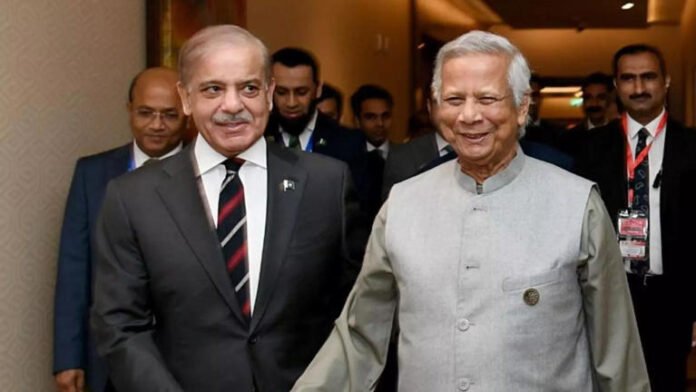Bangladesh and Pakistan recently held their first foreign secretary-level talks in years, signaling a potential thaw in their historically tense relationship. The discussions, which took place in Dhaka, marked a step forward in diplomatic engagement between the two nations. However, the talks were not without controversy, as Bangladesh called for a formal apology from Pakistan for the atrocities committed during the 1971 Liberation War, a demand that has long been a point of contention between the two countries.
The meeting, which took place after a long hiatus of over a decade, was aimed at addressing a range of issues, including trade, regional security, and bilateral relations. However, the issue of the 1971 war crimes quickly became the focal point of the discussions, with Bangladesh reiterating its demand for accountability and a formal apology for the actions of the Pakistani military during the war.
A Historic Turning Point in Diplomatic Relations
The foreign secretary-level talks were seen as a historic moment, marking the first substantial engagement between Bangladesh and Pakistan since the strained relations that followed the 1971 war of independence. After Bangladesh gained independence in 1971 following a bloody war with Pakistan, relations between the two countries have remained fraught, with little diplomatic communication over the decades.
The 1971 Liberation War, which resulted in the creation of Bangladesh, was marked by widespread atrocities committed by Pakistani forces. These included massacres, rapes, and the displacement of millions of people. While Pakistan has occasionally expressed regret over the loss of life, it has stopped short of offering a formal apology, a position that has long been a source of tension with Bangladesh.
During the recent talks, Bangladesh Foreign Secretary Masud Bin Momen emphasized that the issue of war crimes and the demand for an apology for the atrocities committed during the 1971 war remained a core concern for Dhaka. He made it clear that any meaningful improvement in relations between the two countries would be impossible without acknowledging the pain caused by these historical events.
Bangladesh’s Demand for an Apology
The demand for a formal apology for the 1971 atrocities has been one of the most sensitive issues in Bangladesh-Pakistan relations. In the years following the war, Bangladesh has consistently called for Pakistan to take responsibility for the crimes committed during the conflict, a plea that has fallen on deaf ears in Islamabad.
Although Pakistan has expressed sorrow over the events of 1971, it has never officially apologized for the atrocities, a stance that has been a major stumbling block in diplomatic relations. In recent years, Bangladesh has sought international support for its stance, with many countries acknowledging the scale of the suffering caused by the Pakistani military’s actions during the war. However, Pakistan’s reluctance to issue a formal apology remains a point of contention.
In the recent foreign secretary-level talks, Dhaka once again demanded that Pakistan issue an official apology for the war crimes, arguing that the gesture would be crucial for healing the wounds of the past and fostering better relations between the two countries.
Pakistan’s Response and the Path Forward
While Pakistan has not formally apologized for the 1971 atrocities, it has expressed a desire to improve bilateral relations with Bangladesh. In the foreign secretary-level talks, Pakistan’s Foreign Secretary emphasized the need for both countries to focus on areas of mutual interest, such as trade, economic cooperation, and regional security, rather than being bogged down by the historical grievances of the past.
However, it is unlikely that Bangladesh will back down on its demand for an apology. The issue of war crimes and justice for the victims of the 1971 war remains a deeply emotional and politically charged matter for the people of Bangladesh. For many in Dhaka, the call for an apology is not just about the past but also about ensuring that such atrocities are never repeated.
Both countries have also expressed a commitment to improving regional cooperation, particularly in areas like trade, water sharing, and counter-terrorism efforts. The hope is that, despite the lingering historical issues, the two countries can find common ground on these pressing matters.
The Broader Implications for South Asia
The recent foreign secretary-level talks between Bangladesh and Pakistan have broader implications for the South Asian region. The improvement of bilateral ties between these two nations, both of which are nuclear-armed, could help to ease tensions in the region and promote greater stability.
Moreover, the talks could pave the way for enhanced cooperation on regional security challenges, including terrorism, climate change, and economic development. The growing influence of China and the changing geopolitical landscape in South Asia could serve as a motivating factor for both countries to overcome their differences and work together for the greater good of the region.
Conclusion
The resumption of foreign secretary-level talks between Bangladesh and Pakistan represents a significant step towards improving diplomatic ties between the two nations. However, the issue of the 1971 atrocities remains a deeply contentious matter that will likely continue to hinder progress in their relationship. Bangladesh’s demand for an official apology is unlikely to be settled quickly, but the recent talks show that both nations are willing to engage in dialogue and explore avenues for cooperation. The hope is that, despite their troubled past, Bangladesh and Pakistan can eventually find a way to move forward together for the benefit of their people and the broader South Asian region.

